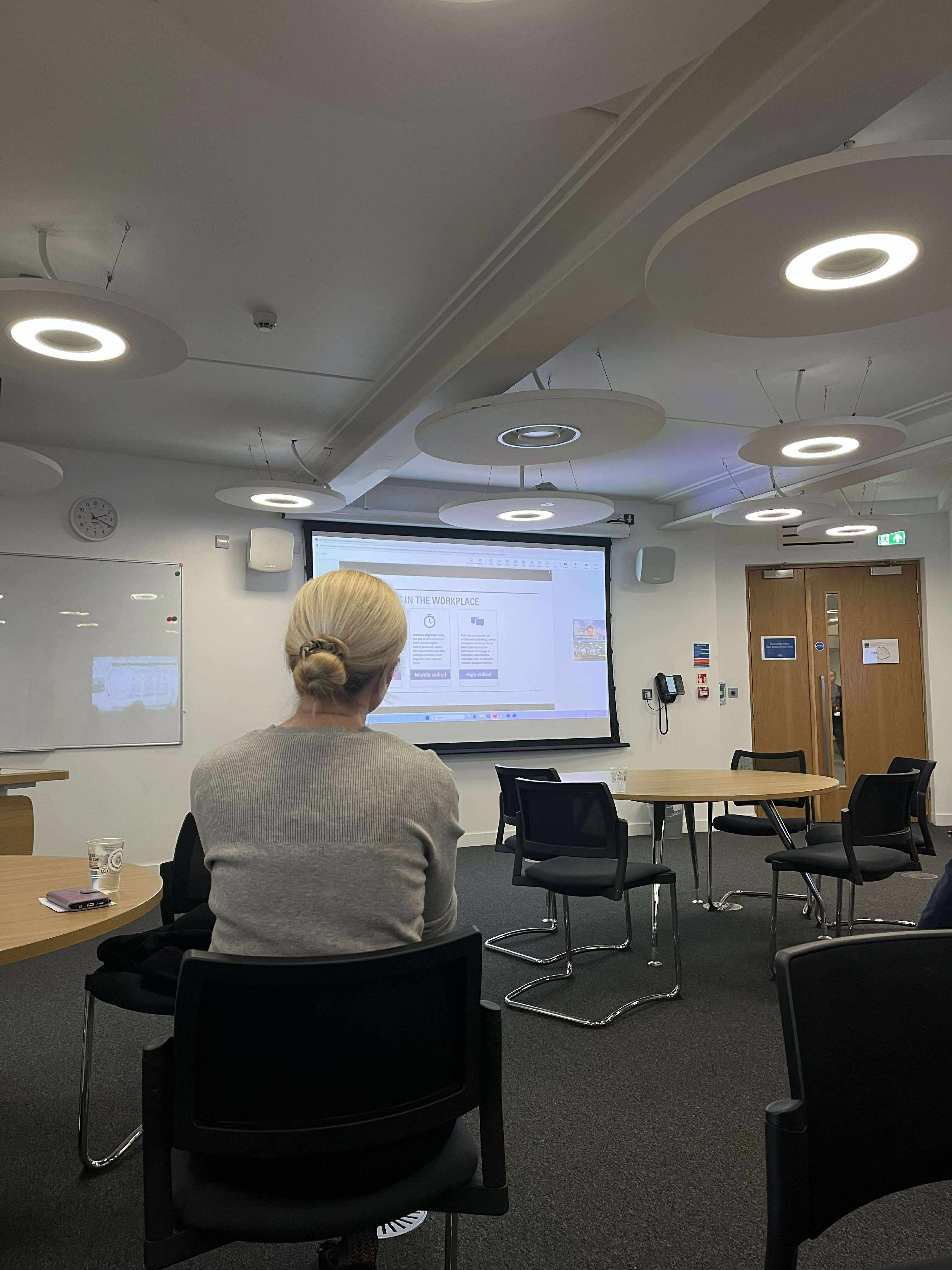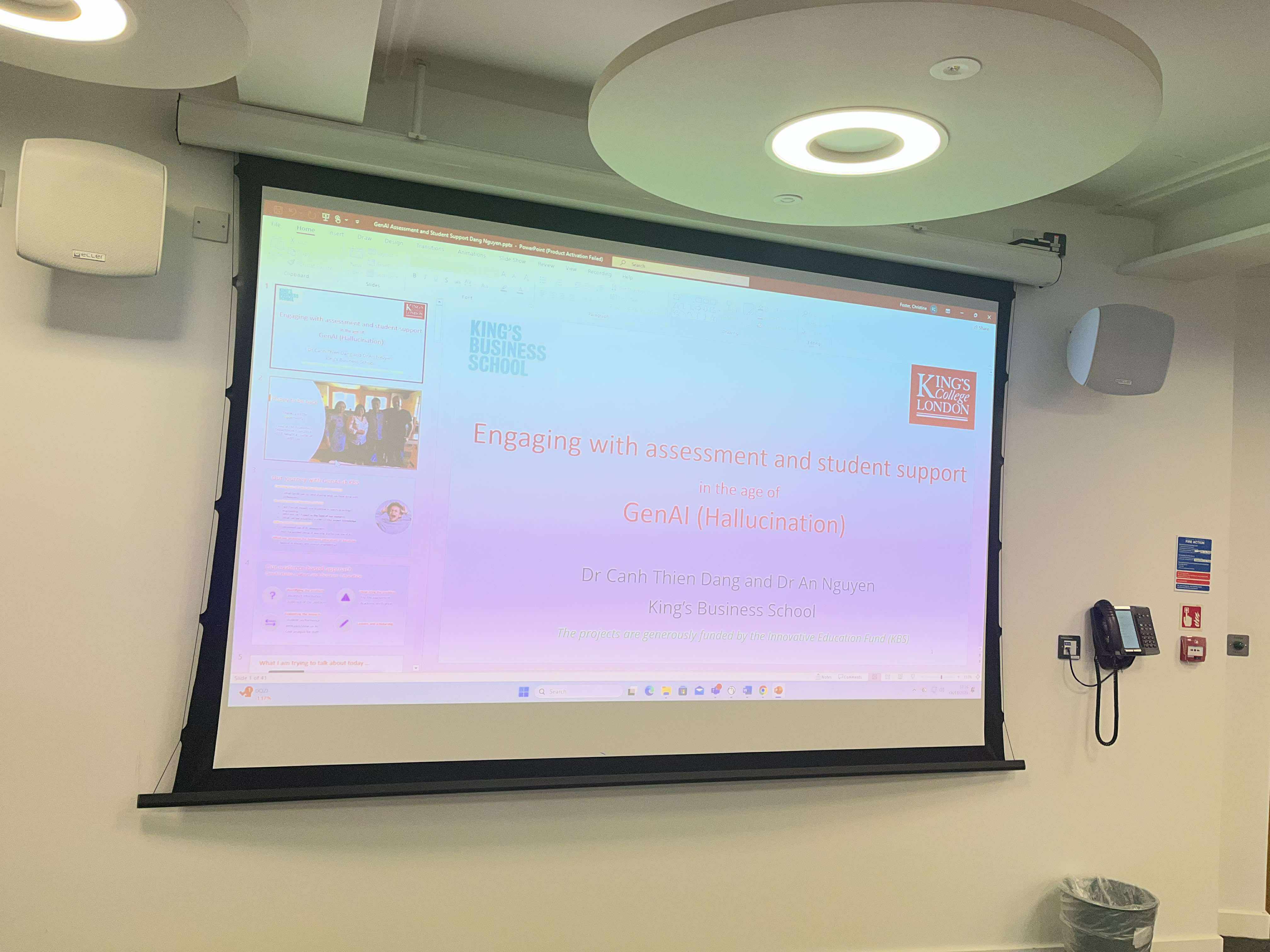Strategic Human Capital Management in the Era of AI
Date:
November 4th, 2025 (UTC+0)
Organizer:
King’s Business School, King’s College London
Symposium Chair:
Personal Bio:
Dr An Nguyen is a Lecturer in Human Resource Management at King's Business School, and Deputy Programme Director of the MSc Global Human Resource Management. She has extensive experience in leading large courses, supervising dissertations, and conducting both online and face-to-face tutorials in HRM at UK universities.
Before joining King's, a taught and conducted research at Coventry University and University of Glasgow. She holds a PhD in Education Policy from the Open University, an MA in Education from UCL, and a BSc in International Relations from the LSE. She has extensive industry experience in India, China, Vietnam, and the UK, having worked and provided consultancy services for corporations, NGOs, and ed-tech companies.
Committee Members:
| Thinh Nguyen | King’s College London | Thinh.nguyen@kcl.ac.uk |
Call for Papers
Background:
The field of Strategic Human Resource Management (SHRM) explores how organisations align their people management strategies with broader business objectives to enhance performance and competitiveness. As businesses face increasing complexity due to rapid technological advancements, globalisation, and changing workforce expectations, the need for HR practices that are both strategically integrated and contextually responsive has become more critical than ever. SHRM moves beyond traditional, administrative HR functions by embedding people management at the heart of strategic decision-making. Two key perspectives dominate this field: the Universalistic (Best Practice) approach, which advocates for the application of certain high-performance HR practices across all organisations, and the Contingency (Best-Fit) approach, which emphasises the importance of tailoring HR strategies to fit specific organisational contexts. Understanding these perspectives, and the internal and external factors that shape HR choices, is essential for future HR professionals and researchers seeking to drive sustainable organisational success.
Goal/Rationale:
The rise of Artificial Intelligence (AI) is transforming how organisations manage, develop, and reward their human capital. From algorithm-driven recruitment to AI-informed performance management and compensation systems, strategic human capital management is entering a new era where technology increasingly shapes people-related decisions. While these advances offer opportunities for greater efficiency, consistency, and data-driven insights, they also raise significant challenges around fairness, transparency, employee wellbeing, and the erosion of human autonomy in workplace decision-making.
This symposium aims to critically examine how organisations can strategically manage their human capital in the age of AI while safeguarding core human values. It will explore both theoretical and practical perspectives on how AI technologies are reshaping talent management, and how HR professionals can align emerging technologies with strategic goals, ethical considerations, and employee needs. By engaging with real-world case examples and current research, participants will develop insights into balancing technological innovation with human-centred leadership, ensuring that AI enhances rather than undermines strategic HR objectives.
Scope and Information for participants:
This symposium focuses on the strategic management of human capital in an era increasingly shaped by Artificial Intelligence. We invite participants to explore how AI is transforming key areas of HRM, including talent acquisition, performance management, compensation design, employee engagement, and wellbeing. Contributors are encouraged to address themes such as:
- The integration of AI technologies into strategic HR decision-making.
- Perceptions of fairness, autonomy, and trust in AI-driven HR processes.
- Ethical, legal, and psychological implications of AI in people management.
- The role of HR professionals in balancing technological innovation with human-centred values.
- Emerging models and frameworks for AI-enabled strategic HRM.
We welcome submissions from academics, practitioners, and students with an interest in the future of work, responsible AI, and strategic HR leadership. The session will include interactive discussions, case examples, and collaborative idea generation to help shape an inclusive and forward-thinking research agenda.
Topics
The main topics of this symposium are listed below.
Management
- Advertising
- Business Performance Management
- Decision Sciences
- Development Planning and Policy
- Entrepreneurship
- Human Resource
- Information Systems
- Information Technology Management
- Labor Relations & Human Resource Management
- Management Information Systems
- Operations Research
- Organizational Behavior & Theory
- Production/Operations Management
- Public Administration and Small Business Entrepreneurship
- Public Relations
- Public Responsibility and Ethics
- Strategic Management
- Systems Thinking
- Time Management
- Total Quality Management
- Tourism Management
E-Commerce
- Cloud Accounting
- E-advertising
- Digital Currencies
- Digital Marketing
- Innovation, Growth, and Social Prosperity
- Internet of Things
- Social Media Marketing
- Web Design in E-commerce
- Online Consumer Behavior
- Online Consumer Data
- Openness, Regional Integration, and Economic Growth
- Technological Change, Research, and Development
Economics
- Economic Development
- Comparative Economic Systems
- Consumer Behavior
- Economic Systems
- Financial Economics
- Household Behavior and Family Economics
- Industrial and Manufacturing
- International Economics
- Labor Economics
- Law and Economics
- Market Structure and Pricing
- Marketing Research and Strategy
- Public Choice
- Productivity and Economic Growth
- Regulatory Economics
- Travel/Transportation/Tourism
- Welfare Economics
- Sustainable Development
Meanwhile, submissions aligned with the overall conference theme are also welcome.
Finance
- Business Intelligence
- Business Information Systems
- Corporate Finance and Governance
- Digital Financial Intermediation
- Finance & Investment
- Financial Risks and Capital Flows
- Global Business
- International Finance
- Prices, Business Fluctuations, and Cycles
- Real Estate Finance
- Finance Residential
- Commercial Real Estate
- Housing Market
- Real Estate Policy Reform
- Green Finance
Business
- Business Analysis
- Techniques, Methodologies, and Models
- Enterprise and Company Analysis
- Requirements Planning and Management
- Requirements Analysis and Documentation
- Strategic Analysis and Design
- Innovating
- Vendor and Tools Track
- Data Modeling
- Business Process Modeling
- Soft Skills and Competencies
- Architectural Frameworks
- Business Rules
- Object-Oriented Analysis
- Structured Analysis
Submission
All submitted papers should report original and unpublished work, experimental or theoretical, and are not under consideration for publications elsewhere. All papers should be no less than 4 pages in length and must strictly follow the format of the symposium template. All papers are subject to reviews and edits. Prospective authors are kindly invited to submit full text papers that includes title, abstract, introduction, tables/figures and references. Other styles of papers are not accepted. Please submit your papers in both .doc/.docx AND .pdf formats as attachments via email to sympo_london@icftba.org by the given deadline. It is unnecessary to submit an abstract in advance.
Publication
Accepted papers of the symposium will be published in Advances in Economics, Management and Political Sciences (Print ISSN 2754-1169), and will be submitted to Conference Proceedings Citation Index (CPCI), Crossref, CNKI, Portico, Google Scholar and other databases for indexing. The situation may be affected by factors among databases like processing time, workflow, policy, etc.
The papers will be exported to production and publication on a regular basis. Early-registered papers are expected to be published online earlier.
This symposium is organized by ICFTBA 2025 and it will independently proceed the submission and publication process.
Highlights
The recent symposium hosted by King’s Business School was a resounding success, bringing together 22 enthusiastic participants for an engaging and thought-provoking session. The event aimed to explore the intersection of artificial intelligence (AI), inquiry-based learning, and the evolving conceptual framework of AI graduate attributes, topics that are increasingly shaping the future of higher education and workforce readiness.
The symposium featured two distinguished speakers from King’s Business School, each offering unique insights grounded in both theory and practice. Their presentations showcased compelling case studies and real-world examples that illustrated how AI can be integrated into teaching and learning environments to foster critical thinking, creativity, and adaptability among students. These examples highlighted practical applications of AI tools in curriculum design, assessment strategies, and personalized learning pathways, demonstrating the transformative potential of technology in education.
A central theme of the discussions was the role of inquiry-based learning in preparing graduates for an AI-driven world. The speakers emphasized that while technical proficiency is important, the ability to ask meaningful questions, analyze complex problems, and synthesize diverse perspectives remains paramount. By embedding inquiry-based approaches into academic programs, institutions can cultivate graduates who are not only technologically literate but also capable of ethical reasoning and innovative problem-solving. The conceptual framework of AI graduate attributes presented during the symposium sparked considerable interest among attendees. This framework outlines the key competencies students need to thrive in a rapidly changing digital landscape, including data literacy, algorithmic thinking, and an understanding of the societal implications of AI. Participants engaged in lively discussions about how these attributes can be operationalized within existing curricula and what support faculty might require to implement these changes effectively.
Audience engagement was a highlight of the event. Attendees actively contributed to the dialogue, sharing their own experiences and raising critical questions about the challenges and opportunities associated with AI in education. These conversations led to several promising ideas for future collaboration, such as joint research projects, cross-institutional teaching initiatives, and the development of shared resources to support faculty in adopting AI-enhanced pedagogies.
The symposium concluded on an optimistic note, with participants expressing a strong commitment to continuing the conversation and exploring practical steps to integrate AI and inquiry-based learning into their respective contexts. The event not only deepened understanding of these important themes but also reinforced the value of collaborative learning and knowledge exchange in addressing the complex demands of contemporary education.
In summary, the symposium served as a catalyst for innovation and partnership, underscoring King’s Business School’s dedication to advancing educational practices that prepare students for success in an AI-driven future. The insights and connections forged during this session will undoubtedly inform ongoing efforts to shape curricula that are both forward-looking and responsive to the needs of learners and society.






Access to Symposium: ICFTBA 2025 Symposium -- London - YouTube
Ways to Participate
Attenance Onsite:
The symposium welcomes participants to attend on-site and share the innovative experiences and researches with the group. Therefore, we provide some general information about the visa application. If you want to attend the symposium on-site, please email the symposium committee: sympo_london@icftba.org.
Visa
In order to ensure the information is correct and up to date, there may be changes which we are not aware of. And different countries have different rules for the visa application. It is always a good idea to check the latest regulations in your country. This page just gives some general information of the visa application.
UK Visa Information
What you need to do
- Check if what you plan to do in the UK is allowed as a Standard Visitor.
- Check you meet the eligibility requirements.
- Check if you need to apply for a visa to visit the UK.
- Apply for a Standard Visitor visa online - if you need one.
Check you meet the eligibility requirements
You must have a passport or travel document to enter the UK. It should be valid for the whole of your stay.
You must be able to show that:
- you'll leave the UK at the end of your visit
- you're able to support yourself and your dependants during your trip (or have funding from someone else to support you)
- you're able to pay for your return or onward journey (or have funding from someone else to pay for the journey)
- you'll not live in the UK for extended periods through frequent or successive visits, or make the UK your main home
Check if you need a visa to visit the UK
Depending on your nationality, you'll either:
- have to apply for a Standard Visitor visa before you travel to the UK
- be able to visit the UK for up to 6 months without needing a visa
You can check if you need a visa before you apply.
If you do not need a visa, you must still meet the Standard Visitor eligibility requirements to visit the UK. You may be asked questions at the UK border about your eligibility and the activities you plan to do.










